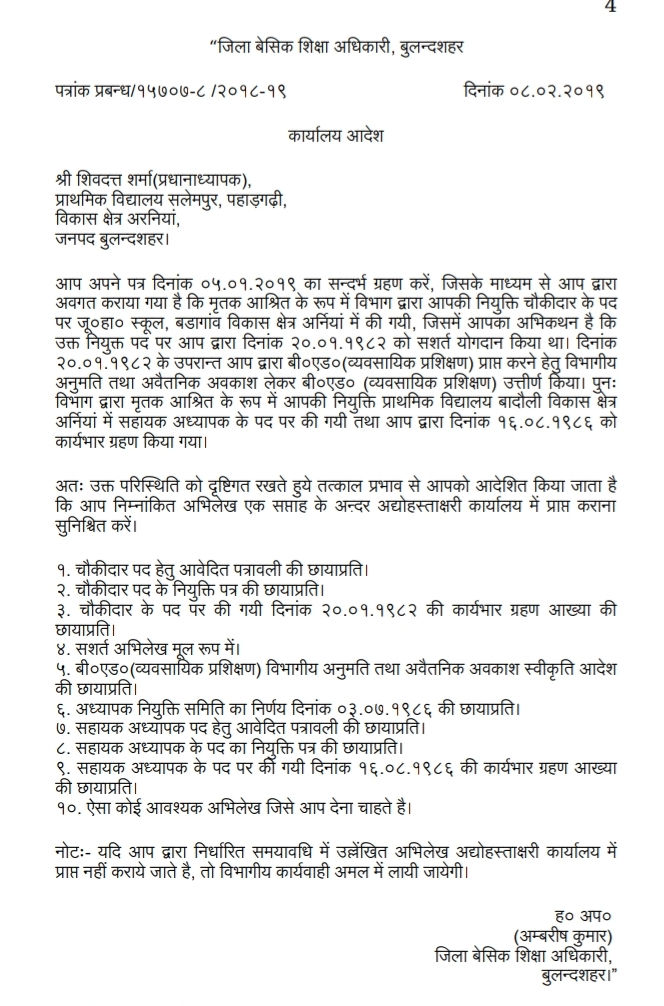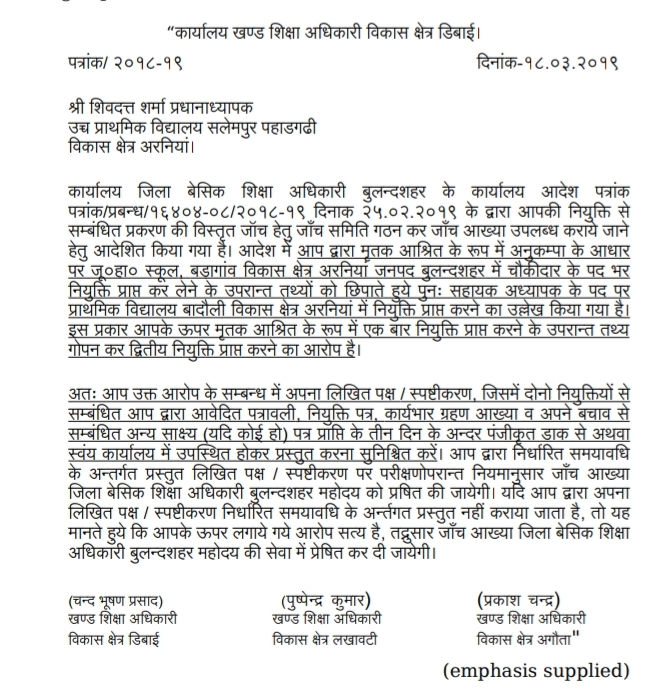Summary
The Shiv Dutt Sharma vs. State of Uttar Pradesh case revolves around allegations of misrepresentation in a compassionate appointment. Appointed as a Chowkidar in 1981, Sharma transitioned to an Assistant Teacher role in 1986 after obtaining a B.Ed., with departmental permission. He served for 32 years, retiring as a Principal in 2019. However, just before retirement, an inquiry alleged he concealed his initial appointment, leading to the cancellation of his teaching post. Sharma contested this, citing due process, unblemished service, and prejudicial timing of action, while the State argued procedural violations. The case highlights key legal issues around compassionate appointments, delayed scrutiny, and fairness in employment law.
शिव दत्त शर्मा बनाम उत्तर प्रदेश राज्य मामला अनुकंपा नियुक्ति में गलत बयानी के आरोपों के इर्द-गिर्द घूमता है। 1981 में चौकीदार के रूप में नियुक्त शर्मा ने विभागीय अनुमति के साथ बी.एड. प्राप्त करने के बाद 1986 में एक सहायक शिक्षक की भूमिका में परिवर्तन किया। उन्होंने 32 वर्षों तक सेवा की, 2019 में एक प्रधानाध्यापक के रूप में सेवानिवृत्त हुए। हालांकि, सेवानिवृत्ति से ठीक पहले, एक जांच में आरोप लगाया गया कि उन्होंने अपनी प्रारंभिक नियुक्ति को छुपाया, जिससे उनके शिक्षण पद को रद्द कर दिया गया। शर्मा ने उचित प्रक्रिया, बेदाग सेवा और कार्रवाई के पूर्वाग्रहपूर्ण समय का हवाला देते हुए इसका विरोध किया, जबकि राज्य ने प्रक्रियात्मक उल्लंघन का तर्क दिया। यह मामला अनुकंपा नियुक्तियों, विलंबित जांच और रोजगार कानून में निष्पक्षता के आसपास प्रमुख कानूनी मुद्दों पर प्रकाश डालता है।
Detailed
The case of Shiv Dutt Sharma vs. State of Uttar Pradesh revolves around a 32-year-long career, allegations of misrepresentation, and the legal intricacies of compassionate appointments in public service. This case sheds light on the challenges individuals face when procedural lapses are scrutinized years after service commencement.
Shiv Dutt Sharma was initially appointed as a Chowkidar (watchman) in 1981 under the compassionate appointment scheme following the demise of a family member. In 1984, he obtained permission to pursue a B.Ed. degree and subsequently transitioned to the role of an Assistant Teacher in 1986. For more than three decades, Sharma served with distinction, eventually retiring as a Principal in 2019.
However, just before his retirement, an inquiry alleged that he had concealed his initial appointment as a Chowkidar while applying for the teaching position. This led to his appointment being canceled on the grounds of misrepresentation, sparking a legal challenge.
The core of the case lies in the validity of Shiv Dutt Sharma’s transition from Chowkidar to Assistant Teacher.
The State argued that the appointment was invalid as it stemmed from concealed facts. Sharma contended that his appointment followed due process, with the department granting permission for his educational advancement and subsequent reappointment. case went to the Single Judge Bench of the Allahabad High Court, petition was disposed of with certain observations and directions. Dissatisfied, Sharma filed a special appeal seeking relief from the Division Bench.
Arguments by the Appellant
The petitioner submitted another reply dated 05.01.2019 stating therein that he had applied for
appointment on compassionate grounds as per his educational qualifications; however, he had given
appointment on the post of Chaprasi/Chowkidar, which was not as per his educational qualifications. It was further submitted that after obtaining permission from the department, the petitioner passed the B.Ed. examination by taking leave without pay and thereafter on the basis of a decision dated 03.07.1986 by the Appointments Committeefor Basic Schools, he was given appointment as trained Assistant Teacher, and he took charge on the said post on 16.08.1986. It was stated that he had not concealed any fact from the department and that as he was to attain the age of superannuation on 31.01.2019, and was to retire on
31.03.2019 after completing the academic session, the notice dated 21.12.2018 had no justification.

The Basic Education Officer, Bulandshahr upon
considering the aforesaid reply, issued an office order dated 08.02.2019 stating therein that the petitioner had been appointed on the post of Chowkidar in the Junior High School, Badagaon, Block Arnia, District Bulandshahar and again he was appointed on compassionate grounds on the post of Assistant Teacher at Primary School, Badauli, Block Arnia and he took charge on 16.08.1986. In view of the aforesaid, the petitioner was directed to furnish certain documents within a week.
The aforesaid office order dated 08.02.2019 is being reproduced below:
No Concealment: Sharma argued that his transition to the post of Assistant Teacher was entirely lawful, supported by departmental permissions and qualifications.
Prejudicial Timing: The allegations surfaced just before his retirement, leading to undue hardship.
Service Record: Over 32 years of unblemished service was cited as evidence of his integrity and dedication.
Arguments by the Respondents

On the basis of inquiry report and the available facts, the District Basic Education Officer, Bulandshahar, by an
order dated 28.03.2019, which was impugned in the writ petition, cancelled the appointment of the petitioner with immediate effect
Misrepresentation: The State claimed that Sharma concealed his prior appointment as Chowkidar, invalidating his teaching position.
Policy Compliance: It was argued that appointments under compassionate grounds must strictly adhere to procedural guidelines, which were allegedly breached in this case.

The court’s focus was on balancing procedural compliance with principles of equity and fairness. It also deliberated on whether long service and retirement benefits should shield an employee from technical lapses in appointment procedures.
Case Laws Associated
State of Rajasthan Vs. Umrao Singh, it was held that once a person is granted compassionate
appointment and he accepts it, the right to claim further appointment on a higher post under the same scheme is
extinguished. Relvant paragraphs of the said judgment are reproduced as under:-
“8. Admittedly the respondent's father died in harness while working as Sub-Inspector, CID (Special Branch) on 16-3-1988. The respondent filed an application on 8-4-1988 for his appointment on compassionate ground as Sub-Inspector or LDC according to the availability of vacancy. On a consideration of his plea, he was appointed to the post of LDC by order dated 14-12-1989. He accepted the appointment as LDC. Therefore, the right to be considered for the appointment on compassionate ground was consummated. No further consideration on compassionate ground would ever arise. Otherwise, it would be a case of “endless compassion”. Eligibility to be appointed as Sub-Inspector of Police is one thing, the process of selection is yet another thing. Merely because of the so-called eligibility, the learned Single Judge of the High Court was persuaded to the view that direction be issued under proviso to Rule 5 of Rules which has no application to the facts of this case.
9. Since both the sides relied on Naresh Kumar Bali's case [(1994) 4 SCC 448 : 1994 SCC (L&S) 909 : (1994) 27 ATC 611 : JT (1994) 4 SC 184] , we will now refer to the same. We had indicated our mind in that very ruling in paragraph 15 of the said judgment. It reads as under: (SCC p. 452, para 15)
“Though the respondent claimed that he had applied for
the post of a teacher the Subordinate Service Selection
Board had not chosen him for the post of teacher because
he did not have the requisite qualification. In fact, the
respondent did not object to his appointment as a clerk
and his claim for consideration for the post of teacher was
one year after his appointment. Thus, the appointment on
compassionate ground as per the scheme had been
completed"
In Krishna Kumar Pandey Vs. State of MP,
it was held that seeking further or upgraded appointment under the scheme of compassionate appointment leads to ‘endless’ compassion which is against the spirit of such scheme. Relevant paragraphs of the said judgment are reproduced as under:-
“5. Now petitioner's grievance is that since petitioner is Higher
Secondary pass, therefore, he should be given appointment on a
Class III post like Ward Boy, Patwari, Registration Clerk, etc. in
terms of the circular of General Administration Department
dated 18-8-2008.
6. Law in this regard is well settled that there cannot be an
endless compassion. Once petitioner accepted
appointment on compassionate basis on a Class IV post
then, he cannot seek upgradation of his appointment after
accepting appointment on a Class IV post and, therefore, in
the light of the judgment of Hon'ble Supreme Court in case of
State of Rajasthan v. Umrao Singh, (1994) 6 SCC 560, wherein
it is held that once a compassionate appointment was given
and accepted, the right to such appointment held stood
exhausted. Second consideration for a higher post is not
warranted. Therefore, prayer for grant of compassionate
appointment on a higher post after accepting compassionate
appointment on a Class IV post, cannot be granted to the
petitioner.”

31. Having regard to the aforesaid discussion, we are of the view that the order dated 28.3.2019, cancelling the
appointment of the petitioner as Assistant Teacher cannot be faulted on both counts, i.e,
(i) the petitioner, having admittedly not possessed the requisite training qualification as prescribed under the relevant rules for being considered for appointment on the post of Assistant Teacher; and
(ii) the petitioner, having earlier been appointed on compassionate grounds on the post of Chaukidar/Chaprasi, the said right to claim appointment on compassionate ground stood
32. The fact that the petitioner had worked for a fairly long period, has been duly taken note of by the learned Single Judge and accordingly while disposing of the writ petition without interfering in the order impugned, it has been provided that the payments made to the petitioner towards salary and other allowances would not be recovered.
33. The judgment of the learned Single Judge, is based on an appreciation of the facts and the material on record and, after recording cogent reasons. We are not persuaded to take a different view in the matter.
34. The appeal is devoid of merit and is, accordingly, dismissed.
The Shiv Dutt Sharma case is more than a legal dispute; it’s a tale of career, service, and the pursuit of justice. The court’s eventual decision will set an important precedent for handling compassionate appointments and retrospective challenges in public service.


Comments